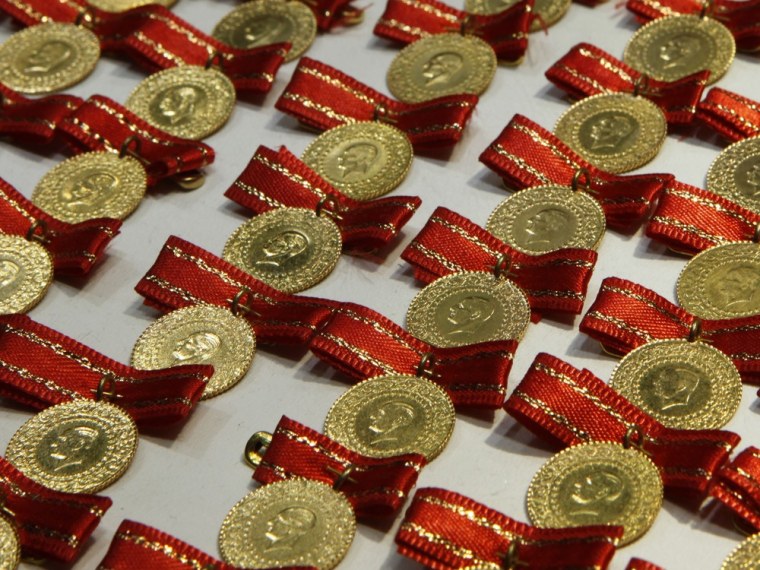Investors are hoarding gold and cash as a perfect storm brews in global equities and credit markets.
Volatile equity markets coupled with the growing risk of sovereign bond default are sparking a rush to defensive assets, fund managers and investment strategists said, with little sign of sanctuary seen in any major global economy.
In an environment where people are "simply looking for the least ugly investment", gold offers a way to preserve purchasing power in the face of market stress and high inflation, said Neil Dwane, chief investment officer at RCM, a unit of Allianz Global Investors.
"It feels like Europe is firmly in the line of fire but it could quite easily be usurped by worries over the U.S. by the end of the week," he said, flagging doubts about the optimism underpinning Asian investment as a hedge on Western woe.
European shares were hit on Monday by news that 24 European lenders either failed or nearly failed stress tests aimed at identifying those too weak to survive prolonged recession or a new financial market shock.
Data published by EPFR Global, which tracks flows in and out of funds running $15 trillion of assets, showed enthusiasm for gold helped drive the biggest inflows into commodities funds for 14 weeks in the week to July 15, when all other 17 major equity and sector fund groups saw outflows.
For those who can't afford gold as prices soar to record new heights, cash is another option for investors unwilling to ride out equity markets or unable to achieve returns from high-quality debt.
Money market funds tracked by EPFR Global pulled in $9.72 billion last week, three times the volume of cash headed for equities or bond funds.
Roger Gray, chief investment officer at the Universities Superannuation Scheme -- Britain's second largest pension fund -- said his 31 billion pound ($50 billion) fund was now "neutrally to slightly cautiously positioned" having shifted money from equity and fixed income to cash, with the size of the USS's cash re-allocation "in the low single digits".
"The truth is that inflation at the moment would make longer dated bond yields pretty unattractive as well...You could buy a UK indexed gilt and you would have inflation protection and still get a small amount of real yield by doing that, but those real yields are as low as they have ever been," said Gray.
Henrik Drusebjerg, senior strategist at Scandinavian financial group Nordea, has recommended clients move a further 5 percent of their portfolios into cash to reach a maximum position of 10 percent.
Drusebjerg, who advises both retail clients and fund managers at 192 billion euro fund firm Nordea Asset Management , has turned more cautious since the spring and wants to see U.S. economic improvement and signs euro-zone debt woes are being effectively addressed before changing his mind.
Hedge fund fog
It is not just long-only investors who are moving away from risky investments. Hedge funds have sharply cut back their bets recently, prime brokers say, with both gross exposure (their total bets on the market), and net exposure (their bets on market direction), lower.
"At times of uncertainty it is better to de-risk the portfolio and preserve our investors' capital, than to accept inadequate remuneration for the amount of risk one is taking," said Pedro de Noronha, managing partner at Noster Capital.
Noster, which is up 7.5 percent so far this year compared with an average hedge fund gain of 0.76 percent according to Hedge Fund Research, has bought credit default swaps on emerging markets and "five different European investment grade companies", and has no positions in banks.
Mike Nicol, manager of the Merrion European Absolute Return Fund said he regretted closing a short on a undisclosed UK bank and had no exposure on the long side to financial stocks, citing poor visibility against the unstable macro-economic backdrop.
"You have to make so many good decisions for not much gain. With problems in Europe and growing concerns in the U.S., it's been a very difficult environment and it's very difficult to make positive returns," he said.
Others, however, feel turbulent equity markets are ripe for a buying spree.
Jim McCaughan, chief executive at Principal Global Investors, the investment arm of U.S. insurer Principal Financial Group with $235 billion under management, still sees "unsettled" U.S. equities as a "buying opportunity", based on expectations of a positive second quarter.
Bernhard Langer, Chief Investment Officer Global Quantitative Equity at Invesco, echoed this opinion and said that equity in well-managed, multinational companies would prove a better inflation shield than gold.
RCM's Dwane also made a case for "under-owned, unloved European equities" but warned stock markets were only for the brave in the near-term.
"Most European investors are massively underweight equities so in theory, if we get some clarity even if that is painful clarity, I think we could get some natural buying of European equities than almost every other equity asset class," he said.
